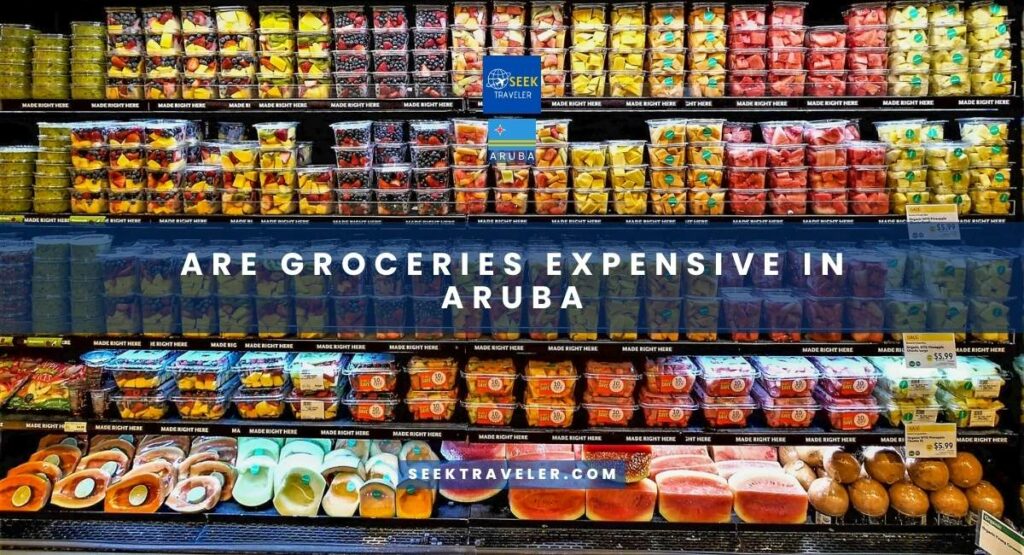Picture yourself lounging on the white sandy beaches of Aruba, soaking up the warm sunshine as you sip on a refreshing cocktail. But as the hunger pangs start to set in, you wonder – are groceries expensive in Aruba? After all, you don’t want to spend all your hard-earned vacation money on food.
Well, fear not fellow traveler, for we have done the research for you. While grocery prices may vary depending on where you shop and what items you buy, overall Aruba is known for its high cost of living due to its heavy reliance on tourism.
However, with a little planning and savvy shopping techniques, it is possible to save money while still enjoying delicious meals during your stay. So grab your tote bag and let’s dive into the world of groceries in Aruba!
Overview of Aruba’s Tourism Industry
Aruba’s tourism industry has been a major contributor to the island’s economic growth. With its year-round sunny weather, crystal-clear waters, and white sandy beaches, it’s no wonder why tourists flock to this Caribbean paradise. In fact, tourism accounts for more than 80% of the island’s economy.
However, Aruba’s tourism industry is not without its challenges. The influx of visitors has put pressure on the island’s infrastructure and resources. To address these issues, Aruba has implemented sustainability initiatives such as renewable energy projects and waste management programs.
Additionally, there’s growing concern about the impact of tourism on local culture and traditions. Efforts are being made to preserve and promote Aruban heritage through cultural events and educational programs for both tourists and locals.
As you begin your journey in Aruba, it’s important to understand the cost of living on the island.
Understanding the Cost of Living in Aruba
Living in Aruba can be a bit pricey, but there are ways to save money without sacrificing quality of life.
When it comes to transportation, renting a car or using public transportation can help cut down on costs.
Housing expenses also vary depending on location and amenities, so it’s important to do research and compare prices before committing to a place.
One of the biggest expenses for any household is groceries. While some may find that groceries in Aruba are more expensive than what they’re used to, there are still options for saving money.
As previously mentioned, taking advantage of local markets for fresh produce can be a cost-effective option. In addition, shopping at larger supermarkets like Super Food or Ling & Sons can offer good deals and discounts on bulk items.
This way you’ll have enough food supplies stocked up at home during your stay in Aruba without having to worry about overspending on meals outside the house.
Where to Buy Groceries in Aruba
When it comes to buying groceries in Aruba, you have a variety of options to choose from. Supermarkets and grocery stores are plentiful on the island, offering a wide range of products including fresh produce, meat, dairy, and packaged goods.
Additionally, local markets and street vendors provide an alternative shopping experience where you can find locally grown fruits and vegetables at lower prices.
Supermarkets and Grocery Stores
You’ll find a variety of options for your grocery needs at the supermarkets and stores on the island. Aruba has several large supermarkets such as Super Food, Ling & Sons, and Kong Hing that offer a wide range of products from local to imported goods. Shopping experience in these stores is quite similar to what you would find in major cities around the world – modern, air-conditioned spaces with organized aisles and shelves.
Here are some things you can expect when shopping at supermarkets and grocery stores in Aruba:
- Competitive pricing: Prices may vary depending on the store, but generally speaking, groceries are reasonably priced compared to other Caribbean islands.
- Imported goods availability: If you’re looking for international brands or specific products that are not commonly found on the island, you can usually find them in these stores.
- Fresh produce selection: Most stores have a decent selection of fresh fruits and vegetables sourced locally or imported from neighboring countries.
- Extended hours of operation: Many supermarkets are open seven days a week with extended opening hours to accommodate shoppers’ schedules.
Now that you know where to go for your everyday grocery needs, let’s explore another side of Aruba’s food scene – local markets and street vendors.
Local Markets and Street Vendors
If you’re looking for a more authentic taste of Aruba, be sure to check out the local markets and street vendors. Not only will you find unique and delicious foods, but it’s also a great opportunity to experience the lively culture of the island.
From savory empanadas to sweet pastries, there are endless options for street food in Aruba. Be sure to try some of the local favorites like keshi yena (stuffed cheese) or funchi cu cabrito (cornmeal porridge with goat meat).
One thing to keep in mind when visiting these markets is that bargaining is common practice. Don’t be afraid to negotiate prices with vendors – it’s all part of the experience! Just remember to be respectful and polite while haggling.
By trying out different street food options and utilizing bargaining techniques at these markets, you can save money on your overall grocery expenses during your stay in Aruba.
Speaking of which, let’s take a closer look at the cost of common grocery items in Aruba…
Cost of Common Grocery Items in Aruba
You can easily plan your budget for daily essentials by knowing the average prices of commonly purchased items in this beautiful Caribbean island. Compared to other Caribbean islands, groceries in Aruba may be a bit more expensive due to import costs and the high demand from tourists.
However, there are several grocery store options available where you can buy fresh produce, meats, dairy products, beverages, and snacks. Supermarkets like Ling & Sons and Super Food offer a wide selection of local and international brands at competitive prices. You may also find smaller grocery stores like Kong Hing or 99 Cent Store that sell affordable canned goods, spices, and household items.
If you prefer organic food or specialty products, The Health Factory and The Island Market are worth checking out. With these options available to you on the island, it’s possible to stretch your budget further when shopping for groceries in Aruba.
Now let’s explore some tips for saving money on groceries during your stay!
Tips for Saving Money on Groceries in Aruba
Looking to stretch your budget and save money on daily essentials during your stay in Aruba? Check out these helpful tips for cutting costs on grocery shopping!
First, look for local markets or supermarkets that offer discounts or sales on certain days of the week. This will allow you to stock up on items at a lower cost and plan your meals accordingly.
Additionally, try buying in bulk for non-perishable items like rice, pasta, or canned goods. This can also help you save money in the long run.
Another way to save money on groceries is by meal prepping and cooking at home. By planning out your meals ahead of time, you can avoid impulse buys and reduce food waste. Consider trying budget-friendly recipes that use affordable ingredients like beans, vegetables, or grains. Not only will this help keep your grocery bill low, but it’s also a healthy option while traveling.
With these tips in mind, you can make the most of your grocery shopping experience in Aruba without breaking the bank.
When it comes to eating out vs. cooking at home during your stay in Aruba, there are a few things to consider…
Eating Out vs. Cooking at Home
Deciding whether to eat out or cook at home can be a tough decision, but did you know that according to a recent survey, the average American spends over $3,000 per year on dining out?
Here are some things to consider when deciding between eating out and cooking at home:
- Eating out may seem convenient, but it can add up quickly. You not only have to pay for the food itself, but also for service charges and tips.
- Cooking at home allows you to control what goes into your meals and can often be much healthier than restaurant options.
- Meal planning can save time and money by ensuring that you have everything you need before starting meal preparation.
- With grocery delivery services now available in Aruba, there’s no reason why cooking at home should be inconvenient.
- Consider trying new recipes from local sources like cookbooks or online resources to add variety and excitement to your meals.
Now that we’ve discussed the pros and cons of eating out versus cooking at home, let’s move on to exploring the local food and cuisine in Aruba.
Local Food and Cuisine
If you’re looking for a taste of the local cuisine in Aruba, there are some must-try dishes that you shouldn’t miss out on.
From hearty stews to seafood delicacies, the island offers a range of flavors and ingredients that reflect its cultural diversity.
To get an authentic experience, head to local markets or small restaurants where traditional recipes are still being passed down from generation to generation.
Must-Try Dishes
You can’t leave Aruba without trying these delicious dishes! One of the most popular ingredients in Aruban cuisine is seafood. Many dishes feature fresh fish and shellfish, such as red snapper, mahi-mahi, shrimp, and crab. The seafood is often seasoned with local spices like cumin, paprika, and garlic, giving it a unique flavor.
Another must-try dish is Keshi Yena, which translates to “stuffed cheese.” This dish features a ball of melted Gouda cheese stuffed with chicken or beef, onions, tomatoes, olives, and raisins. It’s then baked in the oven until the cheese is golden brown. Keshi Yena is typically served as a main course during special occasions or at local food festivals.
If you’re wondering where to find authentic Aruban food after trying these delicious dishes, there are plenty of local restaurants that specialize in traditional cuisine. Some popular spots include Old Fisherman’s Place for seafood lovers and Zeerover for fresh catch-of-the-day meals straight from the fishermen themselves.
Where to Find Authentic Aruban Food
Now that you know about some of the must-try dishes in Aruba, it’s time to discover where to find authentic Aruban food. If you’re looking for a true taste of the island’s food traditions, there are several places to visit.
First on your list should be Zeerovers, a local favorite for fresh seafood and casual dining. This open-air restaurant is located in Savaneta and offers an authentic experience with picnic tables and paper plates.
Another great option is The Old Fisherman, which serves up traditional dishes like stewed conch and goat meat. And if you’re looking for something sweet, head over to Linda’s Dutch Pancakes for delicious pancakes with toppings like Nutella or tropical fruit.
With these recommendations in mind, you’ll be sure to have some of the best Aruban food experiences during your trip. But before we move on to dietary restrictions and special needs, let’s explore more of what the island has to offer in terms of cuisine.
Dietary Restrictions and Special Needs
If you have dietary restrictions, Aruba has options for you! Vegetarians and vegans will be happy to know that many restaurants offer plant-based dishes. Gluten-free and allergy-friendly foods are also available, with some establishments catering specifically to these needs.
Don’t let your dietary restrictions hold you back from enjoying the local cuisine in Aruba!
Vegetarian and Vegan Options
Looking for plant-based options during your stay? Aruba has got you covered with plenty of delicious vegetarian and vegan dishes that will make your taste buds dance like a Caribbean carnival.
The island’s culinary scene offers an array of meat-free alternatives, from hearty lentil stews to flavorful beet burgers. You can also indulge in local favorites like pumpkin soup or corn fritters, which are often naturally vegetarian.
For those looking for more exotic flavors, be sure to try the spicy Jamaican jerk tofu or the creamy Indian chickpea curry. Many restaurants also offer plant-based options for popular dishes like pizza and pasta, so you won’t have to miss out on any classics.
With so many delicious choices available, you’ll never have to sacrifice flavor while sticking to your dietary preferences.
If you have gluten sensitivities or other allergies, don’t worry – Aruba has plenty of options for you too. From gluten-free pasta at Italian restaurants to dairy-free smoothies at beachside cafes, there are many allergy-friendly foods available throughout the island.
So whether you’re vegan, vegetarian, gluten-free, or have other special needs, there’s no need to stress about finding something delicious to eat in Aruba.
Gluten-Free and Allergy-Friendly Foods
You’ll be pleasantly surprised by the variety of gluten-free and allergy-friendly foods available in Aruba, making it easy for you to enjoy your meals without any dietary restrictions holding you back.
Here are some examples of what you can expect:
-
Many restaurants offer gluten-free options on their menus, including pasta dishes made with rice or corn flour instead of wheat.
-
You can find a wide range of fresh fruits and vegetables at local markets, perfect for creating your own gluten-free recipes.
-
Allergy-friendly dining options include seafood restaurants that cater to shellfish allergies and vegetarian cafes that offer nut-free options.
-
If you have specific dietary needs, don’t hesitate to ask your server or chef for recommendations – they’re often happy to accommodate.
For those looking for gluten-free recipe ideas, there are plenty of resources available online and in local cookbooks. With a little creativity and some basic ingredients like rice flour, quinoa, and chickpeas, you can whip up delicious meals that everyone will love.
Overall, Aruba is a great destination for anyone with dietary restrictions – just be sure to do your research ahead of time so you know where to find the best options!
As we wrap up our discussion on groceries in Aruba, it’s important to note that while prices may vary depending on where you shop and what products you buy, overall the cost of living is relatively high compared to other Caribbean destinations. However, with careful planning and budgeting, it’s still possible to enjoy all that this beautiful island has to offer without breaking the bank.
Conclusion and Final Thoughts
In conclusion, to sum it up, your experience of shopping for groceries in Aruba may have been a bit overwhelming at first. However, with the right tips and tricks, you can find affordable options that cater to your specific dietary needs.
It’s important to research beforehand and make a list of the items you need so that you don’t overspend on unnecessary items. When it comes to gluten-free and allergy-friendly foods, there are plenty of options available in Aruba. Many supermarkets carry international brands and specialty products that cater to these needs.
While prices may be slightly higher than what you’re used to back home, the quality and variety make up for it. Overall, grocery shopping in Aruba doesn’t have to break the bank – with some planning and patience, you can find affordable options that fit your lifestyle.
Frequently Asked Questions
What are the best places to shop for groceries in Aruba?
When it comes to shopping for groceries in Aruba, there are a few options that stand out as the best.
One of the most convenient options is grocery delivery, and there are several companies that offer this service on the island. Some popular choices include Super Food, Ling & Sons, and Solo Market.
Not only does grocery delivery save you time and hassle, but it can also help you save money by avoiding impulse purchases at the store.
To further cut costs, consider buying generic brands instead of name brands, shopping with a list to avoid overspending, and taking advantage of sales and discounts when they’re available.
By following these tips for saving money on groceries in Aruba and utilizing the best grocery delivery options available on the island, you’ll be able to enjoy delicious meals without breaking the bank.
Are there any grocery stores in Aruba that specialize in organic or locally-sourced products?
Imagine walking into a grocery store in Aruba and being surrounded by the freshest organic produce, locally-sourced meats, and unique specialty items. If you’re looking for this type of shopping experience, then you’re in luck!
There are several grocery stores in Aruba that specialize in organic or locally-sourced products. By choosing to shop at these stores, you’ll not only be supporting local farmers and producers but also making a conscious decision about what you put into your body. These stores offer a range of products from organic fruits and vegetables to grass-fed beef and dairy products.
It’s important to note that while these products may come at a slightly higher price point than conventional and imported goods, the quality is unbeatable. So if you value organic vs. conventional or local vs. imported, make sure to add one of these specialty grocery stores to your list when visiting Aruba!
What are the typical opening hours for grocery stores in Aruba?
Looking to do some grocery shopping while in Aruba? You’ll be pleased to find that there are plenty of grocery store locations throughout the island, with most stores open from early morning until late at night.
When it comes to parking options for shoppers, many stores offer on-site parking or nearby designated parking areas.
So whether you’re stocking up on snacks for a day at the beach or grabbing ingredients for a home-cooked meal, you shouldn’t have any trouble finding a convenient and accessible location to get your groceries in Aruba.
Are there any cultural differences in grocery shopping in Aruba compared to other countries?
Do you ever consider cultural practices and shopping habits when grocery shopping in a foreign country? In Aruba, there are certain customs that may differ from what you’re used to.
For example, it’s common for locals to greet one another with a kiss on the cheek before starting their shopping trip. Additionally, many stores close midday for siesta, giving shoppers a chance to break and return later in the day.
When it comes to the actual act of shopping, bargaining is not typically done in supermarkets as it may be seen as disrespectful. These small differences can add up and make for a unique experience while purchasing groceries in Aruba.
Can visitors bring their own groceries into Aruba or are there restrictions on importing food items?
When it comes to grocery import regulations in Aruba, you’ll be glad to know that there are no restrictions on bringing your own food items into the country. This is great news for those who want to save money on groceries during their stay.
While dining out can be expensive in Aruba, especially at the more upscale restaurants, buying groceries and cooking your own meals can be a much more cost-effective option. Plus, with access to fresh seafood and local produce, you can create delicious meals while enjoying the freedom of cooking on your own schedule.
So go ahead and pack your favorite snacks and ingredients – you won’t have any trouble getting them through customs in Aruba!
Conclusion
Now that you’ve got a better understanding of the cost of groceries in Aruba, it’s time to put your knowledge to use.
Remember, while groceries may be slightly more expensive than what you’re used to back home, there are ways to save money and still enjoy delicious meals during your stay on the island.
One interesting statistic to note is that, according to Numbeo (a website that compares cost of living around the world), the average price of a meal at an inexpensive restaurant in Aruba is $15 USD. This can add up quickly if you eat out every day during your vacation.
By purchasing groceries and cooking some meals at home, you can save money and have more control over what you eat.
Overall, shopping for groceries in Aruba can be a fun and unique experience. Don’t hesitate to visit local markets and try new ingredients – you might discover some hidden gems!
With some planning ahead and smart shopping tactics, you can enjoy delicious meals without breaking the bank. Happy shopping!

Meet Michael Graham, the main author of SeekTraveler.com. With a wanderlust that knows no bounds, Michael has traversed more than 30 countries across the globe. From sun-soaked Caribbean islands to the ancient marvels of Europe and the captivating charm of Japan, he has witnessed the wonders of diverse cultures firsthand. Michael’s in-depth knowledge and contagious enthusiasm for travel will inspire you to pack your bags and embark on your own extraordinary journey.



